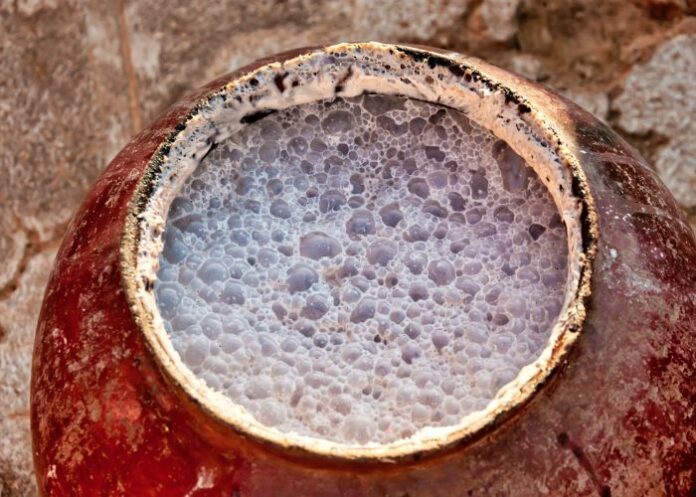Researchers at Walter Sisulu University have found a link between the high oesophageal cancer rates in the province and the consumption of umqombothi (traditional beer), saying the risk of this type of cancer is increased by drinking umqombothi, coupled with a fungus found in inappropriately-stored maize.
Previous research has linked the consumption of traditionally brewed beer, often made with maize, to the high incidence of the disease, specifically among black men in the province.
The study, led by the department of human biology’s Professor Eugene Ndebia, continued previous work to find out why the Eastern Cape had an exceptionally high number of oesophageal cancer cases compared with other provinces, reports Daily Maverick.
“There are a lot of causes that have been brought forward for oesophageal cancer in the province,” Ndebia said, explaining that they had looked at the industrial pollution of the soil by factories and the possible contamination of vegetables with carcinogens.
“The other causes suggested were tobacco and alcohol, but now the main reason we have found is that people with this type of cancer have a diet with a higher level of carbohydrates (in the form) of maize.
Maize meal storage
“Because the Eastern Cape has the highest percentage of people living below the poverty line, especially on the rural outskirts, people have found ways to preserve food by buying it in bulk and storing it.
“Maize on its own is not harmful as long as you buy it and use it within a reasonable time period. The problem is when you have stored it for a while that it starts to develop carcinogenic agents that become harmful to the oesophagus.
“It’s those chemicals that cause cancer, not the maize itself.
“You can buy maize meal and cook it today and that will be fine, but when you cook from the same bag of maize meal after a few weeks, it is no longer the same maize,” Ndebia added.
He said they had shown that fumonisins, a fungal toxin which is carcinogenic, is found in maize stored in poor conditions for up to four weeks.
“The way we store maize is also an important factor – when humidity and temperature (are) not controlled, this leads to the maize becoming contaminated with carcinogens. In rural areas the storage of food is usually not in a controlled environment,” he said.
Traditional beer
Umqombothi – a traditional beer made from maize – is also suggested to be one of the causes of oesophageal cancer.
“In the making of traditional beer, they are adding a lot of artificial components and those components can be carcinogenic… even the containers they use for beer during the fermentation and storage process have an impact. So, the problem is not the maize meal, but how you store it, how long you store it and what you add to it when you are cooking,” he said.
Ndebia concluded his hypothesis on how the cancer occurs, saying that if one’s diet is high in carbohydrates, this can increase reflux. “Our research has led us to monitor a rare type of reflux which is not acid, also known as alkaline reflux,” he said.
He said a surprisingly high number of patients seen by them had alkaline reflux, and they had linked this to patients with a diet high in maize.
“Research has shown that alkaline refluxes are very carcinogenic compared to acid refluxes. This may be why oesophageal cancer patients are usually diagnosed at an advanced stage of the disease, because nothing warns them to seek help early,” he said.
Research published in the South African Medical Journal in 2015 pointed to a possible link between oesophageal cancer and maize when researchers found that cases of this disease started increasing when traditional beer brewers switched from sorghum to corn. Back then, researchers said studies were needed to link fumonisins to the increased incidence of oesophageal cancer in the province.
2015 Study details
Carcinogenic nitrosamines in traditional beer as the cause of oesophageal squamous cell carcinoma in black South Africans
Viness Pillay, Charles Isaacson, Pride Mothobi, Martin Hale, Lomas Kumar Tomar, Charu Tyagi, Mario Altini, Yahya Essop Choonara, Pradeep Kumar
Published in the South African Medical Journal on 21 September 2015
Abstract
Background
Before the 1930s, squamous cell carcinoma (SCC) of the oesophagus was almost unknown among black South Africans. From the 1930s the annual frequency rose. A dietary cause was sought, the staple diet of black people having changed from sorghum to maize (corn), with traditional beer being brewed from maize. Carcinogenic N-nitrosamines in traditional beer were suggested as a cause of SCC of the oesophagus, with Fusarium moniliforme, a corn saprophyte, thought to play a role.
Objectives
To confirm the presence of N-nitrosamines in traditional beer and demonstrate a mechanism for the oncogenesis of oesophageal carcinoma.
Methods
Analysis by high-performance liquid chromatography was conducted for the identification of nitrosamines in traditional beer samples, and molecular docking studies were employed to predict the affinity between N-nitrosamines and the S100A2 protein.
Results
Carcinogenic N-nitrosamines were identified in all six samples of traditional beer examined (N=18 analyses), and docking studies confirmed a high affinity of the nitrosamine N-nitrosopyrrolidone with the S100A2 protein. This may result in the altered expression of the S100A2 protein, leading to tumour progression and prognosis.
Conclusion
It is suggested that carcinogenic N-nitrosamines in traditional beer are a major factor in the causation of SCC of the oesophagus in black South Africans. N-nitrosamines have been shown to produce cancer experimentally, but there has not been conclusive epidemiological evidence that N-nitrosamines are carcinogenic to humans. This study is the first to demonstrate the potential link between N-nitrosamines and a human tumour.
See more from MedicalBrief archives:
Aspirin with acid reducers helps acid reflux patients slow cancer advance
UK-China genetic study confirms that alcohol is a direct cause of cancer
Loss of muscle mass impacts on oesophageal cancer survival

